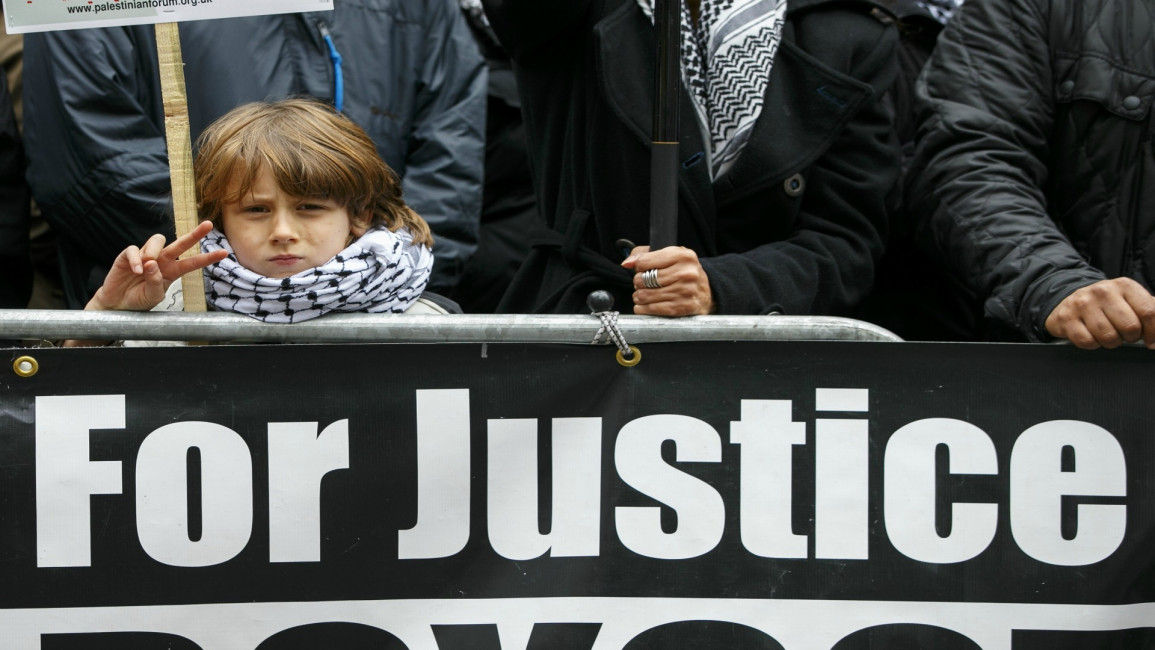
Is Co-op Bank losing its appetite for Palestinian justice?
Friends of Al Aqsa has become the latest in a string of pro-Palestinian organisations to lose their account with the Co-operative bank.
The UK non-profit, which campaigns for the human rights of Palestinians and for the protection of the al-Aqsa sanctuary in Jerusalem from Israeli violations, was informed of the Co-op's decision on 15 December.
But the bank has to date failed to outline the specific reasons for its decision - and risks significant damage to its reputation in the fall-out.
The Co-operative has long been the bank of choice for many campaigns thanks to its ethical approach, including towards illegal settlements in the occupied West Bank. But with the jettisoning of the Friends Of Al-Aqsa, the bank's new approach to Palestine solidarity groups is clear.
The total number of Palestine campaigning groups to be rejected by the bank is now more than 20, a figure that includes the Palestine Solidarity Campaign, the UK's most prominent such organisation.
| Read more: Palestine advocacy group fights closure of UK bank accounts |
Risk appetite
As with the Palestine Solidarity Campaign, the Friends Of Al-Aqsa account closure was justified on the grounds of the bank's decreased "risk appetite". The bank has claimed that it is simply adhering to its legal obligations, and in a statement said that the closure of the accounts of campaigning organisations was to ensure that Co-op services were not used for "illegal or other proscribed activities".
Developments in the UK echo last year's tightening by the US government of scrutiny of financial institutions offering money transfer services for diaspora Somalisto send money back home. Washington's concern about money finding its way to al-Shabab meant there was increased pressure on banks to carry out due diligence.
In a safety-first atmosphere, the flow of cash was driven underground, and remittances to Somalia - which contribute more than annual foreign aid to the war-ravaged nation - were drastically reduced.
Other UK groups that have lost their bank accounts include the Muslim Association of Britain and the charity Islamic Relief, whose HSBC accounts were withdrawn. Another UK-based group, Cuba Solidarity Campaign also had its Co-op account closed, with the bank saying that such moves brought it "in to line with the industry generally".
Black hole
The changes in the Co-op's policies reflect wider changes in banking culture.
"Risk" has become a major factor with the introduction of severe financial penalties imposed for any illegal transactions found on a bank's books. The government has delegated its role to monitor the potential funding of terrorism to the banks themselves.
Risk aversion is the order of the day, and it is feared that it has become a blanket "no" for any group sending money to an area of the world associated with terrorism.
Added to this are significant changes within the Co-op Bank itself, in which the Co-op Group - known for an ethical approach to business - now holds a stake of only 20 percent.
Since entering a financial crisis - when a £1.5 billion ($2.2bn) "black hole" was discovered in its accounts - the bank has been controlled by hedge funds, mainly from the US, who channel their investments via offshore tax havens.
These hedge funds may see political organisations like Friends Of Al-Aqsa as liabilities that do not generate much profit.
But, even bearing these factors in mind, the closure of the Friends' account remains a mystery. In defending the decision, the bank cited "charities… that operate in Gaza".
As Shamiul Joarder, head of public affairs at Friends Of Al-Aqsa, told me: "They are saying it's about sending money abroad as a charity. But we're not a charity and we don't send money abroad. Zero. We're a UK-based NGO.
"We've been with the Co-op for 10 years, and there has never been a problem. There's no reason to say there has been a change in our risk, and they are refusing to give an explanation. There has been no consultation, no warning and the same treatment has not been applied to other types of organisation, so this is bullying."
Protest
Joarder stated that Friends Of Al-Aqsa will continue to demand that the bank engage in an open dialogue and re-instate the account.
"We're not looking to go away. Our supporters have been tweeting to them and our next step is to protest outside branches of the bank. We've also written to the financial ombudsman and we're waiting for a reply."
The hedge funds might be indifferent to the Palestinian cause, but the Co-op's reputation as an ethical investor is at stake. The coming weeks may yet bring clarity to the Friends' case.
"They can't get away with saying nothing," Shamiul Joarder told me, as the group continued to press the bank to explain its actions.
Tom Charles is a London-based writer, editor and literary agent. He previously worked in the UK parliament, including as a lobbyist for Palestinian rights. He has contributed to Jadaliyya and the Journal of Palestinian Refugee Studies. Follow him on Twitter: @tomhcharles
Opinions expressed in this article remain those of the author and do not necessarily represent those of The New Arab, its editorial board or staff.




